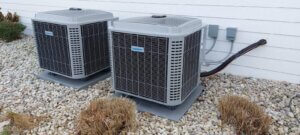Understanding the Basics
Heat Pumps:
A heat pump, as the name implies, pumps heat from one location to another. In summer, it takes heat from indoors and pushes it outside, cooling your home. In winter, it reverses the process, extracting heat from the outdoors—even when it feels cold outside—and moving it inside, ensuring a warm, cozy environment.
Air Conditioners:
Air conditioners are cooling specialists. Their primary function is to take indoor heat and release it outdoors, thus reducing the indoor temperature. Unlike heat pumps, they don’t warm your interiors.
Efficiency and Costs
Heat Pumps:
One of the significant advantages of heat pumps is their dual function, offering both heating and cooling from a single unit. This versatility often means more energy-efficient operations in regions with mild winters. The system doesn’t generate heat but moves it, leading to less energy consumption. However, the dual-function capability often means a higher initial investment.
Air Conditioners:
For homes in blisteringly hot zones, air conditioners are the champions of cooling. Their singular focus ensures that they cool interiors rapidly and efficiently. Initial costs for AC units are typically lower than heat pumps. However, since they don’t provide heating, homeowners often pair them with furnaces or other heating solutions, incurring additional expenses.
Lifespan, Maintenance, and Performance
Heat Pumps:
Being a year-round workhorse, the heat pump typically sees more wear and tear than an air conditioner. This continuous operation can lead to a somewhat reduced lifespan. The more frequent operation also means regular check-ups are essential to maintain peak efficiency.
Air Conditioners:
A seasonal operator, the air conditioner usually enjoys a longer lifespan, provided it’s adequately maintained. Used predominantly in the summer months, it faces less operational stress throughout the year. Consequently, maintenance requirements might be less frequent, but regular check-ups are still essential to ensure a long life.




